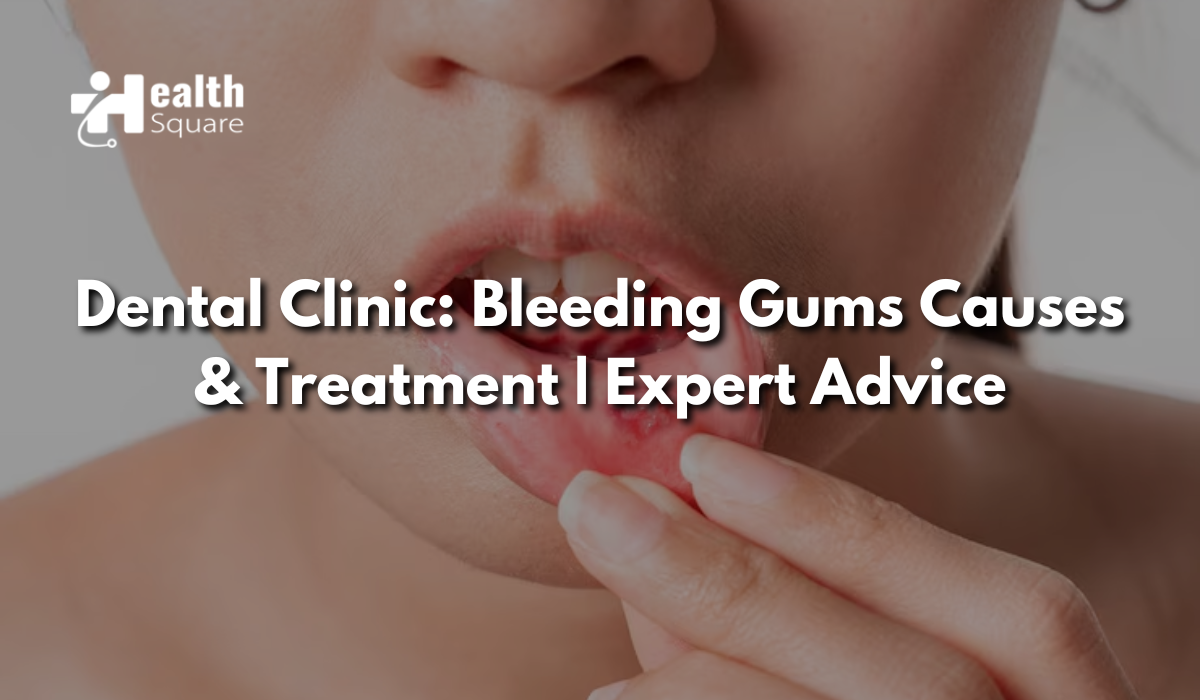Bleeding gums can be both alarming and uncomfortable, but they are often a sign of underlying dental issues that require immediate attention. As a common symptom that many people experience, understanding the causes and knowing the effective treatments are crucial for maintaining oral health. Visiting a reputable dental clinic can provide proper diagnosis and personalized treatment plans to address the root cause of bleeding gums and restore oral health.
Dental clinic plays a pivotal role in addressing this issue, providing professional insight and treatments to alleviate and prevent gum bleeding. In this blog, we delve deep into the various causes of bleeding gums, explore effective treatments, and discuss how a clinic specializing in oral health, like HealthSquare in Jaipur, can assist you in maintaining healthy gums and overall oral health.
Understanding Bleeding Gums
Bleeding gums are primarily a symptom of inflammation, which can be caused by several factors. It’s typically caused by a condition called gingivitis. Gingivitis is like an early stage of chronic gum disease. This issue should be addressed immediately, as it can lead to much more serious issues, like periodontitis, which can lead to tooth loss. Seeking prompt treatment at a dental clinic is crucial to prevent further complications and maintain optimal oral health. Other causes include:
-
Poor Oral Hygiene: Inadequate brushing and flossing can lead to the buildup of plaque, which irritates the gums and causes them to bleed.
-
Hard Brushing: Sometimes, using a toothbrush with hard bristles or brushing too aggressively can also cause the gums to bleed.
-
Medication: Blood thinning medications can increase the likelihood of bleeding gums.
-
Nutritional Deficiencies: Lack of essential nutrients like vitamin C and vitamin K can weaken gum health.
-
Medical Conditions: Certain conditions like diabetes, blood disorders, and hormonal changes (e.g., pregnancy) can contribute to gum sensitivity and bleeding.
Diagnosis and Initial Consultation
The first step in treating bleeding gums is a thorough diagnosis, typically conducted at a dental clinic. During the consultation, a dentist will examine your gums for signs of inflammation, check for plaque and tartar buildup, and recommend a full mouth radiograph to assess any bone loss. A detailed medical history will be taken to rule out factors like medication or systemic conditions that could contribute to the symptoms.
Professional Treatments for Bleeding Gums
-
Root Planing & Scaling: Starting with a scaling procedure, in order to remove all the unnecessary things like tartar & plaque. Then comes root planing, which helps firm up the teeth from the root, reattaching them better.
-
Medication: Depending on the severity, antimicrobial mouth rinses or oral antibiotics might be prescribed to reduce bacterial infection.
-
Surgical Treatments: In advanced cases of periodontitis, surgical procedures such as flap surgery or bone and tissue grafts might be necessary to restore gum health.
Preventive Measures
Prevention is always better than cure, especially when it comes to oral health. Here are some preventive measures to stop gums from bleeding:
-
Proper Oral Hygiene: Brush twice a day with a soft-bristled brush, floss daily, and use an antimicrobial mouthwash to reduce bacteria in the mouth.
-
Regular Dental Check-ups: Visit your dental clinic regularly for cleanings and check-ups to catch any early signs of gum disease.
-
Balanced Diet: Eat a balanced diet rich in vitamins and minerals, particularly Vitamin C, which is crucial for gum health.
-
Avoid Smoking: Smoking is significantly associated with the development of gum disease. Quitting smoking can help improve gum health significantly.
HealthSquare: Your Partner in Oral Health
At HealthSquare, a well-regarded dental clinic cum pharmacy in Jaipur, patients can expect comprehensive dental care tailored to their needs. The clinic’s approach combines state-of-the-art technology with expert care to diagnose and treat various dental issues, including bleeding gums. HealthSquare’s dedicated team ensures that every patient receives individualized treatment plans and preventive care advice to maintain optimal oral health.
Conclusion
Whether the cause is as simple as improving your brushing technique or as complex as treating gum disease, understanding the root of the problem is essential. A dental clinic plays a critical role in this understanding, providing professional care and advanced treatments tailored to each patient’s needs.
At HealthSquare, a reputable dental clinic in Jaipur, the focus on comprehensive dental health ensures that patients not only receive the necessary treatments but also the knowledge and support to maintain healthy gums.
Remember, taking proactive steps through regular visits to a dental clinic and adhering to good oral hygiene practices are your best defense against bleeding gums. With the right care and attention, you can ensure a healthy, beautiful smile free from the discomforts of bleeding gums.
FAQ Section
Q1: Why do my gums bleed when I brush my teeth?
A1: Bleeding gums during brushing are often due to inflammation caused by plaque buildup. Using a soft-bristled toothbrush and improving your oral hygiene routine can help reduce bleeding.
Q2: Can bleeding gums be a sign of something serious?
A2: Yes, persistent gum bleeding can be a sign of gum disease or, less commonly, other medical conditions. Be sure to get it checked out asap.
Q3: How often should I visit a dental clinic for gum health?
A3: It is recommended to visit a dental clinic every six months for routine check-ups and cleanings, or more frequently if you have symptoms of gum disease.
Q4: What natural remedies can help stop gum bleeding?
A4: Turmeric, Clove Oil, Saltwater Rinse, Vitamin C, & aloe vera are some effective natural remedies.
Q5: Can changes in my diet help prevent bleeding gums?
A5: Yes, a diet rich in vitamins C and K, calcium, and omega-3 fatty acids can help improve gum health and reduce inflammation. Foods like citrus fruits, leafy greens, dairy products, and fish can be beneficial.


